







Uzbekistan rocks as a travel spot! It’s got mind-blowing history, lively culture, and striking architecture. Explore ancient cities like Samarkand and Khiva, wander through bustling bazaars, and follow the legendary Silk Road for an adventure to remember.
Check out our wide range of discovery tours in Uzbekistan now.

Find out more
Welcome to the latest edition of The Explorer.
This issue transports us to the cultural melting pot that is Sri Lanka, as we join Sarah Bravo on her first independent adventure without kids. Then we’re off to South America for an in depth destination spotlight, and a whistle-stop tour of Peru, from the Inca Heartlands to the buzzing foodie capital Lima.
If you’ve never been on a cycling holiday before, I challenge you not to be tempted by Winnie Stubbs’ stories from her explorations on two wheels. We’re also introduced to two sets of travel buddies, and four top Tour Leaders.
Since the last issue of The Explorer, we’ve become a Certified B CorporationTM after an 18-month application process. This has been, for Explore and for me personally, a huge milestone and something we’re incredibly proud of as a team. Read more about that journey, and what it means, on p22.
Happy reading, and happy travels.


The authentic colours of architecture not only enhance the beauty of a place, but also reflect its history and the joy and culture of the people who live there. We asked our Explore travel experts to share some of their colourful highlights.

Coming into Jaipur it’s a typical Indian city, bustling with activity and brimming with a cacophony of sounds from tuk-tuks navigating traffic to Chai Wallahs selling their fragrant tea. Then, passing through the old city’s walls, the scene transforms into a sea of dusky pink buildings stretching all around, with the incredible facade of the Palace of the Winds as its decorative centrepiece.
As a keen photographer the colours of Jaipur keep drawing me back – from sunrise at the Amber Fort reflected in the waters of Maotha Lake, to the intricate blue and turquoise mosaics of the City Palace in the fading light of golden hour, Jaipur is a veritable kaleidoscope of colours.
Chris Ellis, Product Manager for India
Below
Ijust recently came across the totally stunning city of Belém, on the northern coast of Brazil. The buildings are all post-colonial in the Portuguese style, faded by time with some almost totally reclaimed by nature. What a beautiful place!
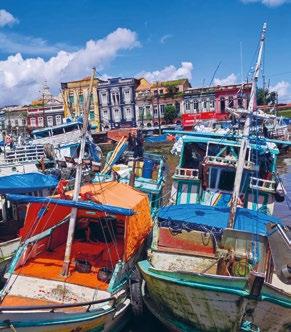
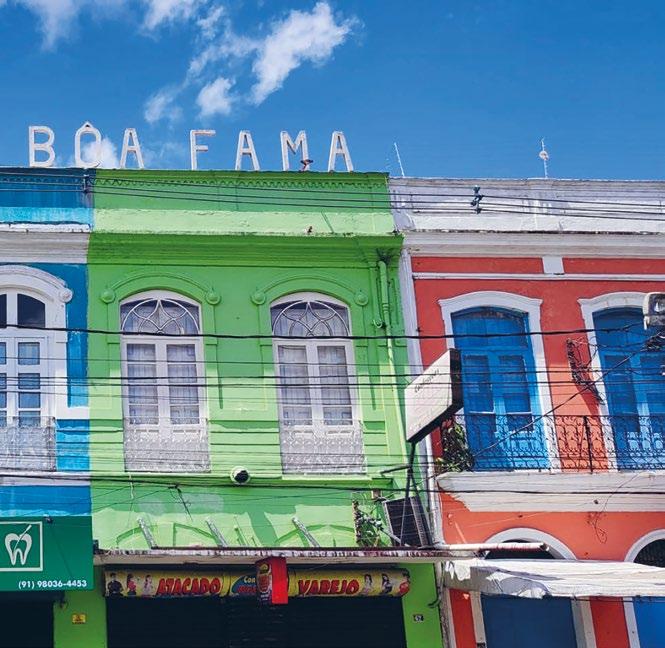
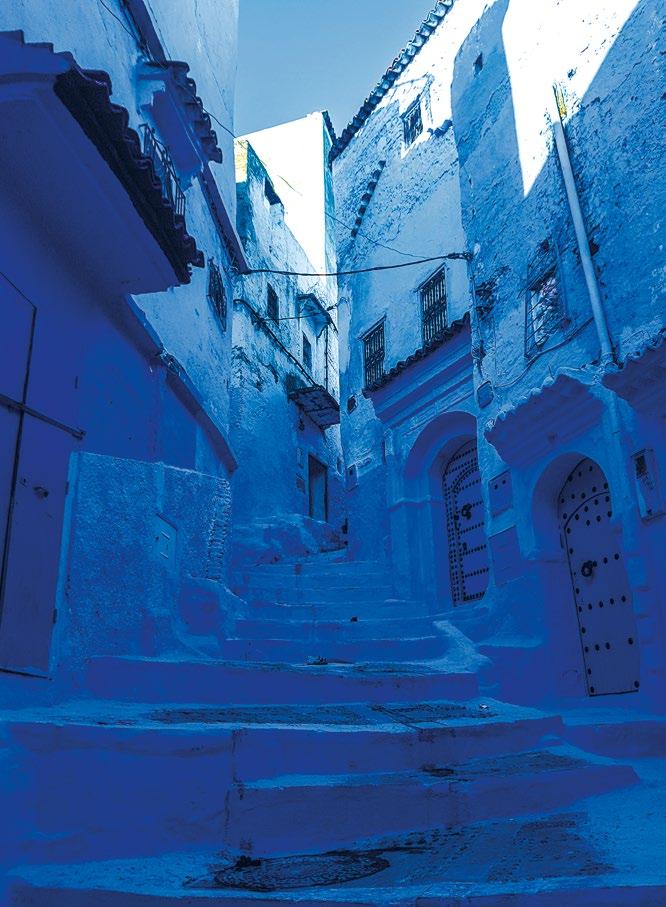
The blue pearl of Morocco sits slightly off-the-beaten-track in the north of the country and is well worth a visit. There are different theories as to why the city was painted blue. Some say it was a religious act and that inhabitants wanted to be closer to heaven, thus painting the city the colour of the sky. Others say it was to repel mosquitos during a bad spell of malaria. No matter what the reason, walking through the charming blue alleys feels like stepping into a postcard.
Antony Barton, Product Manager for Morocco
How does one describe Cuba? It is truly unlike anywhere else I’ve ever visited. Touching down in Havana feels like stepping into a time machine, with incredible sights and photo opportunities at every turn. Buildings, cars, people – everywhere you look, Havana is a palette of peeling pastel paintwork that you won’t forget in a hurry.
Nadine Cullen, Product Manager for Cuba
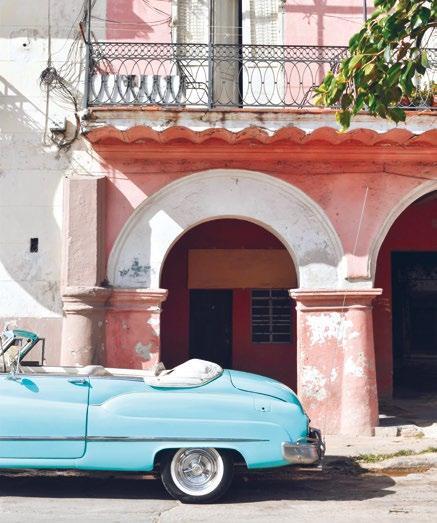
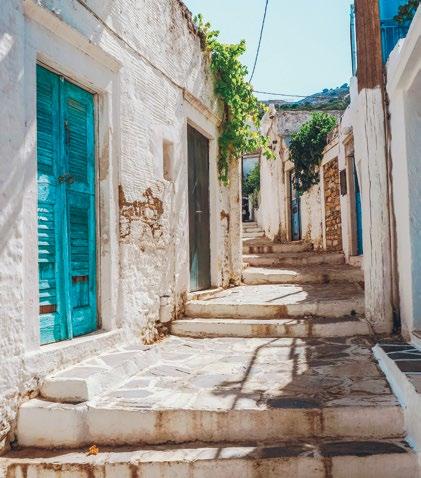
You can see the iconic Cycladic architecture in many Greek villages but Naxos – an island that’s a lot less busy and seems to go at a more relaxed pace than its famous counterpart Santorini –has a firm place in my heart.
Initially enforced during the military dictatorship to evoke patriotism, the white buildings with iconic blue accents on roofs and blinds, have become as iconic a must-see as the Acropolis in Athens.
I suggest you go in Spring, when the bougainvillea adds that extra splash of colour and makes it even more magical.
Alison Butler, Product Manager for Greece
Alaska’s cold climate and breath-taking landscapes offer nature lovers an unrivalled playground. Explore the country’s wild side while paddling through coastal waters on a sea kayak, keeping watch for bears and moose along the shoreline and go on a hiking tour in Denali National Park, home to North America’s highest peak. This is the perfect vacation if you’re looking for towering mountains, endless forests, and abundant wildlife in the heart of the Last Frontier. explore.co.uk/AKH
If you’re visiting a cold destination, why not make it one of the chilliest spots on earth – Antarctica! Sail to the frozen continent aboard an expedition ship and get involved in the exciting research projects onboard and on land. Encounter the continent’s residents – leopard seals, albatross, and the elusive emperor penguins. It’s a frosty adventure you won’t forget! explore.co.uk/CCEP
Had your fill of warmer climes or just fancy somewhere a little cooler? Don’t sweat it! From crisp mountain retreats to icy island adventures, there are plenty of destinations to escape the heat.
While Japan is renowned for its cherry blossom season, consider visiting during the quieter, cooler months for a different experience. Discover iconic attractions and combine them with winter activities like an ice-breaker cruise in the Sea of Okhotsk. Then, marvel at the stunning snow sculptures at the annual Sapporo Snow Festival. Embracing Japan’s winter charm offers a unique perspective on the country’s natural beauty and cultural festivities beyond the hustle and bustle of the busier spring season.
explore.co.uk/JIF
“Consider visiting during the quieter, cooler months for a different experience.”
The massive plateau in southern Argentina is a cool hiking paradise. Imagine glaciers and icy peaks all around, with ocean views on three sides – like a giant nature puzzle waiting to be explored. Get ready to soak in the beauty of this epic, off-the-beatenpath destination. explore.co.uk/PA
Make the most of the amazingly long daylight hours on a summer adventure to Iceland. Discover the cities, Reykjavik and Akureyri, and the volcanoes, waterfalls and glaciers that make up the country’s unique dramatic landscape. explore.co.uk/SUN
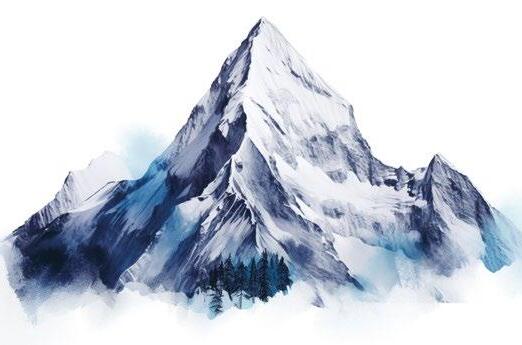
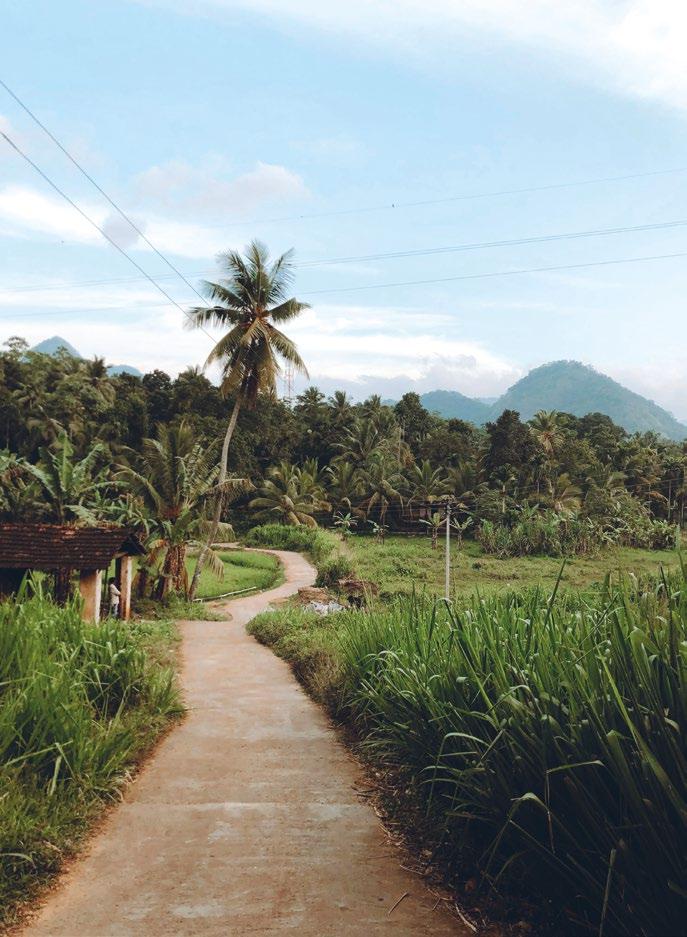
Travelling without her family was a bold step for Sarah Bravo. But a Sri Lankan adventure turned out to be the trip she never knew she needed.
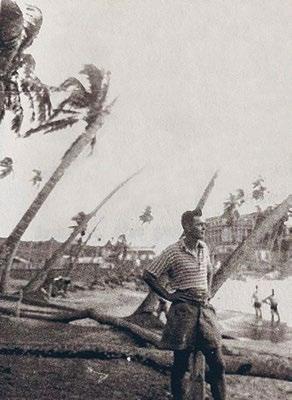
So, here’s my story. Mum of three runs away to tropical island of dreams. ON HER OWN. Children and husband survive. The end.
Of course, I wasn’t exactly running away. More tentatively tiptoeing. And the children and husband were always going to be fine for a week. It was me I was more worried about.
I’d fantasised about going to Sri Lanka for years. My grandfather, a captain in the Navy, had been stationed there in 1942. His war diaries had captivated me as a child, stories of his beloved ‘Ceylon’, his ‘enchanted island’. The faded photographs of him in Kandy on the back of an elephant and on the beach in Galle felt like an invitation. So why not now? Before I could change my mind, I was booked onto a small group tour with a grin on my face (and a knot in my stomach}.
Confession: I’d never been away from my family for more than two nights before, and as the departure date crept closer, I was riddled with self-doubt. ‘What sort of mother would fly to the other side of the world (actually not quite that far) and leave the kids for such a long time (it was a week, but still)?’ ‘Am I selfish to want time alone?’ Yep, all of that.
It wasn’t until the plane had taken off that I was able to focus on my adventure ahead. My knowledge of the country was minimal. I knew Sri Lanka was off the southern tip of India. I knew it was smaller than Ireland. I knew the 2004 tsunami, 2019 terrorist attacks and then the
pandemic had affected their tourism business badly. But I was soon to learn how resilient and hospitable the Sri Lankan people are, with their gentle Buddhist culture, laid-back way of life and respect for the natural world.
The gentle nature was apparent on meeting my Tour Leader at the airport. A man of experience (and excellent stories), nothing was too much trouble for Amare. From the get-go I felt safe in his hands, and happy to hand over any control I would usually exercise on our own family holidays (and how liberating that felt!).
Turns out there’s nothing more welcoming than a Tour Leader who tells you every day what to wear (for temples, shoes off, no naked shoulders, no knees uncovered), what to pack (mosquito repellent, spare socks for hot floors), what to avoid (dogs without collars, no selfies with a Buddha, take your room key out onto your balcony in case the door shuts) and what to tip (we don’t – everyone contributes to a kitty which is handed out to the relevant services). At our welcome dinner, I discovered my group were Explore veterans, half a dozen trips under their belts at least, and were as knowledgeable and as reassuring as our Tour Leader. One delicious local beer down and I realised I hadn’t thought about the kids for hours.
Often referred to as South Asia in miniature, Sri Lanka packs a lot in such a small space. The tour I had chosen reflected this, covering national parks, culture, city, and coast over a busy five days. First stop: Wilpattu National Park. The diversity of the island astonished me, watching through the window of our bus as the landscape changed from turquoise waters to misty mountains to lush jungles in a matter of hours. The park itself felt more woodland retreat than animal sanctuary. It’s the biggest but has an undiscovered feel, and is home to deer, sloth bear, leopards, elephants, and more. The leopards were elusive on the day we visited, but a buffalo bathing near a baby croc, a party of the prettiest deer, a statuesque elephant claiming a small island as her own, show-off peacocks and a heart-melting sunset made the drive worthwhile.
Sacred Sri Lanka is a trip in itself, but Amare did a good job of showing us the highlights. We walked barefoot up the 1,840 steps to Mihintale Mount, the site of the first Buddhist monastery, and took photos of the layered green landscape and Insta-friendly monkeys. We were mesmerised by the Dambulla cave temple, dating from 1st century BC, each cave hiding exquisitely painted Buddhas. And of course, Sigiriya Rock, the most popular attraction of the country, and one of Sri Lanka’s seven UNESCO World Heritage Sites. This dazzling fortress, dating back to 5th century AD, was once the home

Left
A tuk-tuk ride is the perfect combination of a travel must-do, a local art experience and a convenient (and rather thrilling) mode of transport
Below
The view is worth the climb – on the way down from having made it up to Sigiriya Rock
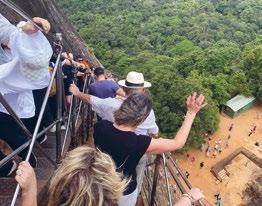
of an unstable king who murdered his father and built a palace around him on top of a 200m high rock. There are 1,250 steep steps up the side of the rock to the top and it’s not for the fainthearted. We walked up in single file, gripping tightly to the thin handrail, smiling through our uneasiness. But once up on the flat top, a new world opened, and it was as if we were floating between the sky above and the jungle below.
I was beginning to feel like a child in a sweet shop. Sacred temples, painted frescoes, steep climbs, underground caves. For years my focus on holidays had been on keeping the kids engaged, fed, awake, safe. For the first time in a long time, I was in the moment. Without thinking, ‘eek watch your step,’ ‘wait for me,’ ‘hold my hand’, ‘not long until lunch’.
‘Wandering the streets of Kandy at sundown, thousands of starlings took over the sky and drowned out the noise of the tuk-tuks.’
The place I’d been most keen to visit was the walled city of Galle that had featured heavily in my grandfathers’ diaries, and it didn’t disappoint. Built by the Dutch in 1663, it’s the country’s southernmost tip and surrounded by ocean on three sides. Inside the stone defences that protected the old town from the 2004 tsunami, we found Dutch colonial buildings, ancient churches, quirky cafes, and boutique hotels. And outside, the most beautiful beaches. I recognised the lighthouse that had appeared in my grandfather’s photographs. That afternoon I felt privileged to have had the opportunity to dip my toes in the water. I found one of his entries from 1942, describing his journey back from a night in the town.
“What I enjoyed even more was the rickshaw journey back through the quiet still night, cool after the torrid heat of the daytime. We jogged along with the fireflies darting here and there among the palms and sacred lily trees which gave off their most perfect aroma and I could not help but be struck by the feeling of peace and tranquillity. Then we came to the
All about the ball Sri Lanka’s national sport is volleyball. It holds a special place in the country’s cultural identity and is often regarded as a unifying force, transcending ethnic and social boundaries.
Spicy history
Cinnamon originated in Sri Lanka! It was discovered by Egyptians around 2000 BC and was first used for embalming.
Sri Lanka’s waterfalls aren’t just a great sight to see, they also fuel most of the country. Over 50% of Sri Lanka’s power comes from the tumbling waters.
Loco for the Coco Coconuts are the country’s national heroes – and incredibly versatile. The meat yields desiccated coconut, oil, and milk. The shell, husk, and fronds make activated carbon, coir ropes, and fertilizer. Coconut flower produces sap, dried into sugar. Even the roots are boiled to obtain a dye.
seafront to smell the ever-fresh tang of the sea blowing across the fertile greenery, until we arrived back in time for dinner and bed.”
Like my grandfather, it was the unexpected moments along the way that will stay with me. Stopping off at a local fish market one morning and seeing the smiling women in brightly coloured dresses pull the fish off the nets. Watching sure-footed men shimmy up tall coconut palms to collect the sap from the flower blossom (and tasting the delicious coconut toddy). Through the window of the bus, watching the children walk home from school, in pairs, dressed beautifully in crisp white dresses and shorts, umbrellas to shield them from the sun. Wandering the streets of Kandy at sundown, amazed by the thousands of starlings taking over the sky and drowning out the noise of the tuk-tuks.
But the biggest surprise of my adventure wasn’t the destination. It was the people I travelled with. My group were younger than I had expected, with great energy, and so much travel experience that every day I learned something new. When we first met, we were strangers but five days later we’d unravelled our lives. It was an empowering experience – sharing our stories without judgement – and I realised that the trip had renewed a confidence in myself I hadn’t had since before the children. My companions were full of tried-and-tested ideas (‘always bring a small hot and cold thermos and coffee sachets in your backpack for long travel days.’). They shared genius apps for photo sharing, data deals and keeping in touch with family. They showed me how to get the golden ticket shot when trying to photograph wildlife. And they made me feel part of their club.
So, did the kids survive? Did I miss them? Yes, and yes. But most evenings, we’d FaceTime, and I’d hear about their days. I shared pictures daily of what I’d seen and where we’d been. And although my week seemed like a lifetime of new experiences, their week sped by as usual.
Dream destination aside, travelling in a small group was a revelation. So easy it felt like a luxury break for a juggling mid-life woman. We packed way more in than I could ever have organised myself, thanks to Amare’s local knowledge. It was inspiring to engage with new people who had so much to offer and liberating to reconnect with the old me.
Sri Lankans have an expression they use when they greet you. ‘Aryoubowan’ means ‘may you live long.’ This enchanted island (and the coconut toddies?) certainly worked its magic on my grandfather. He lived two months shy of 100 years.
Read the extended version of Sarah’s adventure on explore.co.uk/SarahinSriLanka

Sarah Bravo
Editor, writer, and teen manager
Sarah Bravo has worked in magazines for more years than she can shake a coconut at.

Below Sri Lanka has great produce (they grow around eighty different varieties of fruit and veg alone), which results in a wide range of delicious vegetablebased dishes
Sri Lanka in Depth + Maldive Dhoni Cruise Spend 15 days immersing yourself in Sri Lanka’s culture, meeting its people, and savouring its food highlights. Then, extend your trip to the Maldives for some relaxing days, cruising through paradise. explore.co.uk/SLM
Walking in Sri Lanka
On this moderately graded walking holiday, you’ll be exploring the island’s highlights on foot which allows you to experience it in a different way to the less active visitor. Immerse yourself on hikes through the jungle, ascent the sacred Adam’s Peak and look for elephants on safari. explore.co.uk/WSL
From the saddle
Go on a circular journey in Sri Lanka by bike. Use backroads to pedal past villages, through tea fields, all the while soaking in local life and sights. explore.co.uk/CSL
Family time
Can’t go without the kids? Why not just take them along on your trip of a lifetime! Our family tour for kids up to 17 combines the best of Sri Lanka and the Maldives in a fully packed 15-day adventure. explore.co.uk/FSL
Adventure isn’t just physical – it’s about your mindset, too. Breaking records and the rules, these modern-day female explorers are nothing short of inspirational.
ELISE WORTLEY
@woman_with_altitude
Walking in the footsteps of history’s female adventurers stands (or steps) Elise Wortley. This British explorer, writer, and presenter wants to bring the achievements and stories of forgotten female pioneers into the spotlight.
Initially starting as a project to help her mental health –using the comfort of the outdoors and her interest in ground-breaking stories and achievements of women adventurers – ‘Woman with Altitude’ led to Elise walking in their footsteps herself, taking us along on her journeys while highlighting the lack of female representation in exploration. Elise believes that adventure is not just about conquering or winning, but about connecting to the natural world.
Wortley takes a unique approach by only wearing and taking clothes and equipment that would have been available to these adventurers at the time. Since starting ‘Woman with Altitude’ Elise has recreated the journeys of Nan Shepherd, Freya Stark and more, after more across Scotland, India and Iran.
Having recently starred in Channel 4’s survival series ALONE, Wortley’s next endeavour will see her take on Mont Blanc in the Alps in honour of Henriette d’Angeville, the first woman to climb Mont Blanc unaided in 1838.

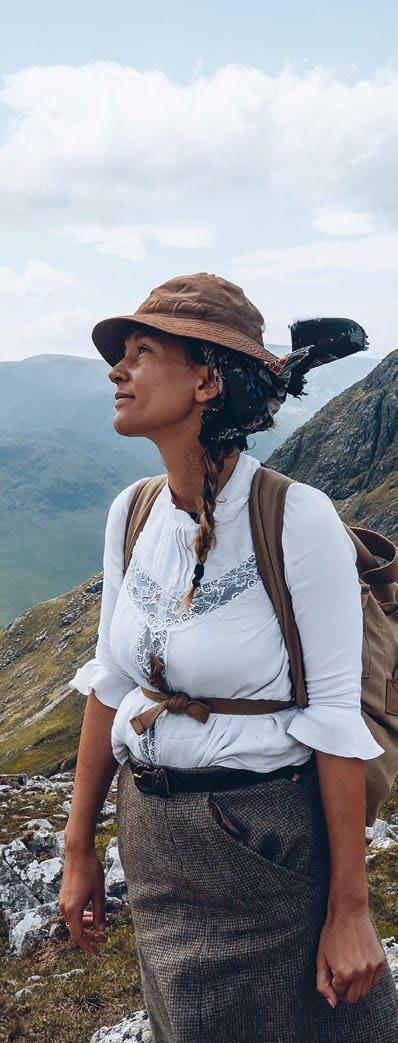
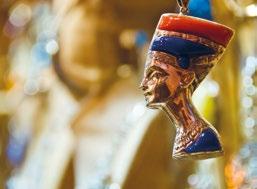
DR KATHLEEN MARTINEZ
@drkathleenmartinez
Cleopatra famously said that “no man will ever find my tomb” – and it seems she may have been onto something. Experts have searched for her long-lost tomb for centuries, but Dr Kathleen Martinez believes the Egyptian queen could be buried within Taposiris Magna Temple, in the ancient city of Alexandria.
In 2022, Martinez discovered a tunnel beneath the temple, complete with Cleopatra-associated items. Then, in 2024, her team were searching underwater when a huge storm hit the region; the first in 15 years. Miraculously, this cleared the seafloor sediment, allowing her team to locate multiple points of interest. Martinez’s search continues – and we’re excited to see what she’ll come across next...

PREET CHANDI
@polarpreet
Preet Chandi is nicknamed ‘Polar Preet’ for good reason. The British Army physiotherapist has tackled one of the most unforgiving corners of the world solo and emerged victorious. Not only is Chandi the first woman of colour to complete a solo expedition across Antarctica, but she also holds Guiness World Record titles for the longest solo unsupported one-way polar ski journey for a woman, and the longest solo unsupported one-way polar ski journey overall.
Polar Preet isn’t shy of a challenge and constantly strives to break boundaries, as well as encouraging others to do the same. One of her exhilarant feats saw her cover 1,130km (700 miles) in 31 days, all while pulling a 75kg sled with everything she needed.

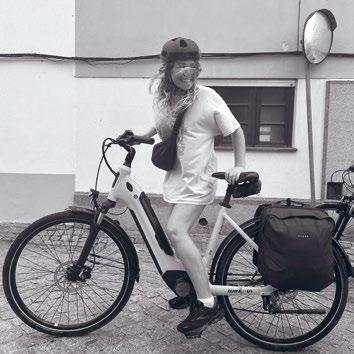
Me and my two-wheeler


Now settled on the other side of the world to her parents and sister, journalist Winnie Stubbs has committed to savouring more precious holiday time with her family – and has found cycling trips to be just the ticket.
Words –– Winnie Stubbs



It’s 11am on day three of our cycling holiday, and a small market town – a collection of sandstone buildings in the bowl of the valley – appears like an apparition, baked in buttery, late-summer light. A café by the river is just opening its doors for the day, so we claim the table under the cork tree, pull out the pack of cards that has become an honorary sibling, and order a round of beers. It’s not yet midday, but we’re on holiday, and we’ve been cycling since 8.30am – we’ve earned it.
As an English expat now based in Sydney, the time I spend with my family is rare and precious. And following a recent cycling trip that we took together in the south of Portugal, we’ve resolved to now spend any holidays together travelling on two wheels.
Though we’ve all cycled for as long as I can remember –me to my friends’ homes on spring evenings after school, dad to the shop to collect the paper on Saturday mornings –our trip through Portugal was the first cycling holiday we’d taken as a family. Mum and Dad began setting off on bike-based adventures the second my sister and I left home; jetting off with our aunts and uncles to explore Provence, California, and the heel of Italy with just their panniers for luggage. They’d come home with new favourite card games, stories of epic journeys up killer hills, and a deep appreciation for a place built on something more akin to exploration than simply tourism. It was descriptions of the long al fresco lunches that got my sister and I across the line, and after one false start in 2019 (I broke my arm, so we took the route by car), in September 2023, we finally found ourselves on the family bike trip we’d talked about for years. And while we generally pride
ourselves on our chaotic failings as a family, this particular trip was an all-out, roaring success. We spent the whole time laughing, and at dinner on the second night – at a restaurant by the beach where we accidentally ordered 15kg of fried mackerel – we set about preemptively planning cycling holiday number two.
We started our Portuguese adventure in Vila do Bispo, and on day one, the heavens opened. None of us had packed rain jackets, so we were soaked in seconds – pushing along the highway through sheets of rain. At a café an hour or so in, we had to wring out our saturated t-shirts onto the street, and still left puddles by the counter as we ordered enough pastéis de nata to give us the energy to carry on. On the mud track out of town, my bike slipped beneath me and I found myself sprawled on the path, legs caked in red, sandy clay. Our first few hours were a catalogue of disasters, and even as they were playing out, the debacle was a joyful one; hilariously hapless.
On that first day in Portugal, we stopped for lunch in a dark, wood-panelled restaurant just off the market square, and warmed our bones with pumpkin soup and bowl-like cups of sangria jewelled with boozy orbs of orange. By the time we’d finished eating, the skies had cleared and the rain-washed streets were sparkling in surrender.
The rest of the week passed in a sunny blur. We’d cycle for an easy four to six hours every day, stopping along the way for rounds of cards at roadside cafés, and refuelling every night with enormous meals in the market squares of quaint Portuguese towns.
“We finally found ourselves on the family bike trip we’d talked about for years.”

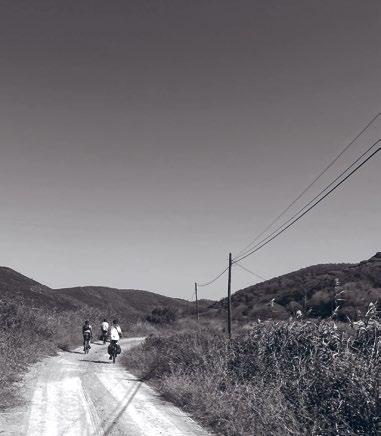
Whether you’re a keen cyclist or more of a weekend bike rider, we think cycling is one of the greatest ways to explore Europe. Our product manager and cycling expert James Adkin has put together his suggestions on places to discover Europe on two wheels.
“What better way to see the beautiful landscapes, sights and culture of Europe than on two wheels under your own steam. You’re guaranteed to get brilliant views, fantastic cities, and a wide range of different cultures and culinary delights. When riding a bike you genuinely feel closer to the places you are exploring, it engages all of your senses and gives you a sense of freedom and achievement.”
Discover the ‘heel’ of Italy on a mix of leisurely and moderate grade cycle rides through the sun-drenched region of Puglia. Along the way you’ll get to enjoy the superb Pugliese cuisine with cheese from a local ‘caseificio’, a visit to a family-run bakery, and a wine tasting. explore.co.uk/CIP
Comfortable cyclists – Croatia
Breeze along the beautiful Dalmatian Coast on a one-week cycling tour. Pedal your way from Split to Dubrovnik, taking in ancient sites, medieval towns, and fishing villages as you island-hop Croatia’s iconic coast. explore.co.uk/CCD
Cycling enthusiasts – Albania
Are you a strong cyclist looking for a new place to explore? Discover the highlights of Albania while cycling through stunning scenery along peaceful, almost traffic-free roads in the mountains and along the turquoise coast. explore.co.uk/CAB
Still have questions?
Check out our blog post ‘7 questions answered for your first cycling holiday’ on explore.co.uk/first-cycling-holiday
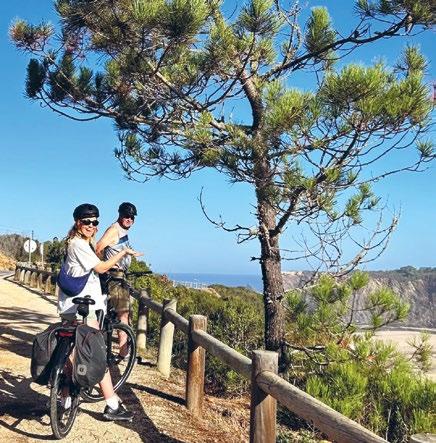
Left
We can see the coast! Getting to see the distance you’ve covered is a highlight
Below

Charcoal grilled sardines are a Portuguese staple – especially during summer months

Looking back, it was the post-break climb on that third day that really got me thinking. We had got back on our bikes and pushed up the hill out of the town. The climb was the steepest yet, and at the top we collapsed by a ruined fort and looked out over the valley.
“That’s where we came from,” my sister’s boyfriend, who had planned and guided our route, pointed at a patch of terracotta roofs in the distance. To resist smiling in that moment would have been an impossible feat.
“There’s something about the motion of travelling by bike; the sweet satisfaction of push and flow, the speed as you sail downhill, and the strengthening buzz of an upwards climb.”
So rarely are we afforded the primal pleasure of a far-reaching view, and the satisfaction that comes from covering it. For those of us who live in cities, life often goes by following the same rinse-andrepeat pattern.
We spend our weekdays between walls that contain our work, our wellness, our creativity and our leisure – eyes catching only occasionally the expanses of space beyond our streets. The hills that fall out around us are blocked by buildings, and even if we’re taking our bike on our daily commute, the journey itself is hidden from view; what we see on the way is just the car in front, the shopfronts bordering the roadside. When I think of holidays – of the ultimate escape that’s at once grounding and comforting and calming and joyful – I think of following a dusty bike path through a beautiful new place, of sitting down next
to my Mum at the end of the day with a shared sense of achievement.
There’s something about the motion of travelling by bike; the sweet satisfaction of push and flow, the speed as you sail downhill, and the strengthening buzz of an upwards climb. There’s a childlike joy to zooming along on two wheels, and though that applies to the quotidian cycle –the ride through the city to the office, the morning zoom to the shops – a cycling holiday affords you a connection to a place that’s built by tracing a route with your eyes, then reaching the end of it with humming legs and a calm, quiet mind.
A few weeks ago, I had a dream that’s stayed with me. It was evening, and the sun was setting over a beautiful landscape; rolling hills folding into flaming amber sky as Dad and I walked home from dinner. It wasn’t the actions of the dream that lodged themselves in my mind, it was the feeling; a shared sense of exhausted elation. Luckily, I know exactly where to find it.

Winnie
Stubbs @winniestubbs
Winnie Stubbs is an English-born writer now based in Sydney. Prior to her current role as Lifestyle Writer at Time Out Sydney, she contributed to other travel and lifestyle publications including Gourmet Traveller, Broadsheet, A Hotel Life and We Are Explorers
If it’s adventure with a side of fitness you’re after, these more active breaks will get you moving. Scale mountains, explore coral reefs, or kayak serene lakes – all while learning about new cultures, and savouring amazing food.
Can’t decide which activity you want to do and love to mix it up? Then we suggest you canoe, kayak and cycle your way through the highlights of the Turkish Riviera. From hiking in the Taurus Mountains to uncovering the ruins of Xanthos, this tour keeps you busy with a range of activities that will let you explore Turkey’s cultural and historical highlights. explore.co.uk/MAT
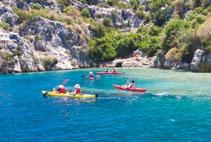
Spend a week, taking in the beautiful mountain scenery of the Picos de Europa National Park in northern Spain. Stay local and explore the area in depth with walks in the unspoilt and wild landscapes of the western, central, and eastern massifs. explore.co.uk/PC
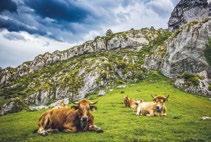
Discover Kerala’s backwaters on two wheels! Pedal through tea plantations and along spice trading routes, where the air is thick with the smell of cardamom. Dive into Kerala’s rich history with visits to palaces and cultural sites and embrace the relaxed village life, when meeting local families. explore.co.uk/CKB
Are you looking for a big bucket-list hiking challenge? How about trekking to the summit of Africa’s highest mountain – Mt. Kilimanjaro in Tanzania? Spend a week ascending to the top, sleeping in wild camps under millions of stars (you might even pick one of our full moon departures!), and sharing the journey with a group of like-minded hikers. explore.co.uk/KCR
Discover the Alps on foot starting from the Chamonix Valley. Making use of the extensive cable car system, strike out on day walks with awe-inspiring views including sections of the famous Tour du Mont Blanc long distance trail. explore.co.uk/MBH
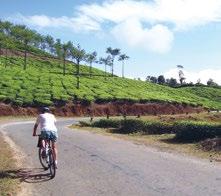
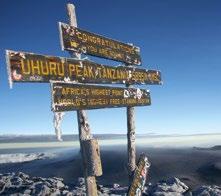
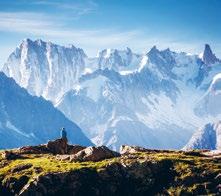
Let us tell you some of the lovely shenanigans we’ve been up to in recent months.
We’ve had sustainable travel in our DNA since Explore first launched in 1981. Having a positive impact on the places we visit and the people we meet is at the heart of what we do. So, achieving B Corporation CertificationTM in February after a long process was a huge moment for the whole team. We asked Managing Director Michael Edwards what it means.

What is a B Corporation?
As a Certified B Corp in the travel industry, we’re counted among businesses that are leading a global movement for an inclusive, equitable and regenerative economy.
What does this mean for customers?
Our tours have always had sustainability at their core – we want to ensure that our small groups have minimal footprint and maximum positive impact on the places we visit.
How do we go about achieving this?
We choose small, locally owned and run businesses to support – from local partners and Tour Leaders to hotels and restaurants. It’s why our groups always meet and interact with locals on their holidays. It’s why we support charities and initiatives all over the world, and why we set up the Explore Foundation to bring our customers and the destinations and communities that we visit even closer.
Will anything change?
No, none of this will change, but we’ve made a commitment to continue along the journey of improvement. We’ve now been independently verified by the globally recognised B Corporation to meet some of the highest standards out there, which will hopefully give you reassurance that we’re doing everything we can to provide responsible, once-in-a-lifetime adventures while being a force for good and protecting our planet for generations of future travellers!
How does it feel?
We really couldn’t be prouder. As a business we’re purpose-led in everything we do –we’re continually striving to “Be Better Than Yesterday” and we absolutely want to be held accountable for the goals we set ourselves.
Find out more about our B Corp Certification on explore.co.uk/b-corp
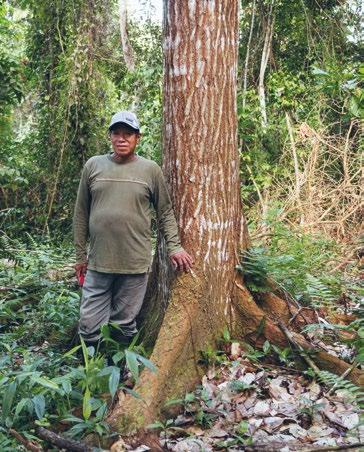
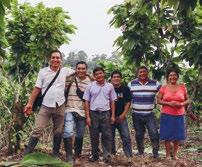
Explore partners with Cool Earth to support indigenous communities in the Peruvian Amazon through community engagement, education, and empowerment.
Cool Earth, a climate change charity with offices in Peru, Papua New Guinea, and the UK, collaborates with indigenous people to protect rainforests and combat the climate crisis. Rainforests store significant carbon, offering substantial climate benefits if safeguarded.
Explore contributes £2 per customer booking to Cool Earth, benefitting rainforest communities like the Asháninka in Peru. The income they make with initiatives like forest monitoring and cacao farming empowers them to resist
deforestation pressures and manage their land effectively and sustainably.
We are proud to have donated over £150,000 to Cool Earth over the last decade, supporting the Asháninka. Cool Earth’s long-standing partnership with Explore strengthens community trust and helps to scale up rainforest protection strategies. Together, we empower local leadership to manage rainforests effectively and combat the climate crisis – a win for the people and the planet.
A beloved Peruvian dish recommended by our Tour Leader Hector (see page 33). This stir-fry was invented in the early 19th century by Chinese-Peruvian chefs in Lima, perfectly showcasing the fusion inherent to the country’s cuisine.
Makes three generous portions.
Ingredients
Vegetable oil
1kg sirloin or tenderloin beef
80ml white wine vinegar
150ml soy sauce
5tbsp oyster sauce (optional)
80ml Peruvian pisco (optional)
2 tomatoes (cut into chunks, and seeds removed)
1 onion
1 garlic clove
Chives or coriander
Instructions
Best made in a wok, this dish can also be made in a regular frying pan.
1. Warm vegetable oil in the pan, before adding the meat to sear it, adding some salt and pepper to season. Make sure the pieces aren’t too small –you don’t want to fully cook the meat. Do this in batches if required.
2. Do the same with the vegetables. Add them to the wok and fry quickly on high heat and then remove.
3. Return the pan to the heat and add the soy sauce, oyster sauce, vinegar and pisco (if using). Mix together and allow the sauce to reduce a little.
4. Then add the meat and vegetables back into the sauce to mix it all up. Make sure you remove it as soon as the meat has reached your desired cooking point.
5. Finish by adding chives and coriander and serve immediately with chips and/or rice.

“I

Solo travel is on the rise and the chance to make lifelong friendships is at the heart of it. Xenia Taliotis speaks to four solo travellers who found each other and never looked back.
Words –– Xenia Taliotis

Iwas on an escorted coach tour through Italy, only my second solo break following the loss of my husband. I had chosen an Italian road trip that would take me to several cities in 10 days, which I hoped would remind me of how dolce la vita could be.
I had settled into my window seat on the coach, and prepared the props I could hide behind if necessary – a book, iPod and sunglasses – when one voice could be heard through the cacophony of people boarding, piercing my peace like an arrow. I turned to look at the excitable group at the back of the coach. Two things were clear: they had travelled together before, and Lucie was the centre of the excitement. I sat silently in my seat, hankering down, and feeling like the Matchstick Girl – a forlorn soul looking in on other’s joy.
All that changed when I was sat next to Lucie at dinner. “The trouble with me,” she said, a few glasses down the line, “is that every man wants to sleep with me, and every woman wants to be me. Now tell me your story…” “Well,” I replied, “I can honestly say, those are not my problems.” We held each other’s gaze for a few seconds, and then roared with laughter…
The rest of the trip raced by – culture-filled days gave way to chat-fuelled evenings; small-talk blossomed into more meaningful conversations. Lucie and I grew closer, as we set aside our respective public identities to reveal the people we are in private – two middle-aged women with shared passions for art, literature and good wine.
Lucie and I are still valuable friends to this day. It got me wondering about other relationships that have taken root far from home. Is it easier to show our true selves to strangers? Are we more open to adventure when we find the right travelling companion? I asked four explorers to share their stories.
“I found my travel buddy on a trip to Ecuador and Guatamala”
Tiffany Wainford, ski guide, 58, and Gillian Sheath, retired occupational therapist, 65, met in the Galapagos in 2008, and have travelled together ever since.
Gillian on Tiff
“Tiff lives in London, and I’m in Lancaster, and had it not been for our trip to Ecuador and the Galapagos, we’d never have met and would have missed out on a joyful, adventure-filled friendship.
There was an instant rapport, a connection, even though –on paper at least – we were an unlikely match: back then, she was a property developer and landlord, and I was working for the NHS, but we made each other laugh from the off. I soon found out she’s partial to a gin and tonic, as am I, and, like me, she never travels without teabags. Even before the trip ended, she’d invited me to South Africa, where her mum lives, and I accepted immediately. We’ve travelled together ever since.
Tiff’s been to more countries than I have, so we try to choose destinations that are special to one or the other of us, or where she’s not been. We’ve covered Mexico, Jordan, Cambodia, Burma – where my father was engaged in hand-to-hand combat, and Japan, where he was part of the peace-keeping force. Next up is India – we’re going to cycle through Kerala. We’re both keen cyclists but won’t cycle together on the trip – she’s faster on the flat, I’m better with hills, plus separating during the day and
“She makes every holiday an adventure, and every adventure a holiday.”
chatting to other people gives us loads to talk about when we’re back in our room at night.
Me having a travel buddy has never been an issue for my partner, Will. He knows it’s something I love to do. We’re adults – we have our own lives, and our own interests, we don’t need to spend all our spare time together.
Meeting Tiff on that trip was a gift from the universe. She’s assertive, but never mean. She encourages me to try different things – food especially. I’d never have eaten spider had it not been for her… She’s an absolute darling. She makes every holiday an adventure, and every adventure a holiday.”
Tiff on Gillian
“Gillian is the most generous-spirited, kind, adventurous person anyone could ever hope to meet. In some ways, she’s my moral compass – she truly walks the walk where charity is concerned, giving of her time and self, as well as her money, and that inspires me to do the same.
She has an incredible optimism that always manages to lift the mood of those around her. I’ll give you a few examples –on one trip, the bus broke down. Everyone was tired and fed up, and she started singing all the great hits from the musicals. Before long, many people had joined in, singing, whistling, clapping. It was such a great way to bring everyone together. And in Jordan, we all got drenched to
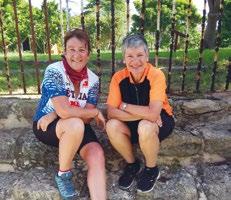
“The sight of two middleaged women chasing a racoon must have been the talk of the town!”
the bones while cycling the Wadi Rum, as did our spare clothes. Again, her energy made us see that this was all part of the experience. Then there was our cycling trip to the Baltics, when her luggage didn’t turn up. She did 10 days on a bike without her kit, and all without a gripe!
Gillian and I are different, yet very aligned in our take on life. We know our fitness will decline sooner or later, so we’re doing as much as we can while we can, whether that’s tandem parachuting or taking on a tough bike ride. We are fully aware of how privileged we are to be able to travel and are committed to helping the communities we encounter on our trips – sometimes with hilarious consequences. In Mexico, Gillian bought some biscuits from a stall, put them in her bag, and then put her bag down for a second. In an audacious snatch-and-grab, a racoon shot out from nowhere and ran off with it. We got it back, but the sight of two middle-aged women chasing a racoon must have been the talk of the town. And then there was the time we went to visit an orphanage. Everyone else bought notebooks and pencils to take along. Not us. We decided to take footballs. You should have seen us in the market trying to pump them up! Gillian is just one of those people. Her thinking always goes deeper and our experiences are usually richer for it.
Senan, my partner, is fabulously tolerant of my wanderlust, and my trips with Gillian. Quite aside from the fact that he doesn’t enjoy long-haul trips, he knows that the time I spend with Gillian is something I treasure and look forward to. She’s a rare soul. I am enormously lucky to have met her.”
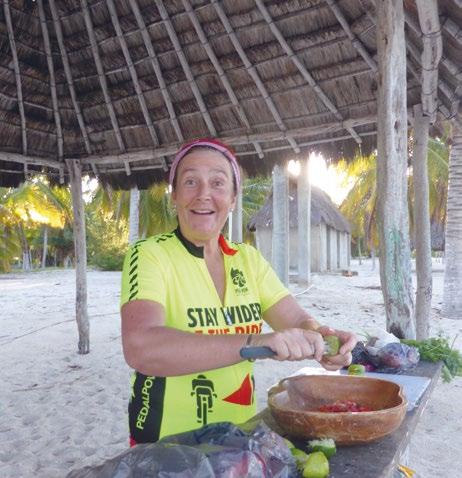
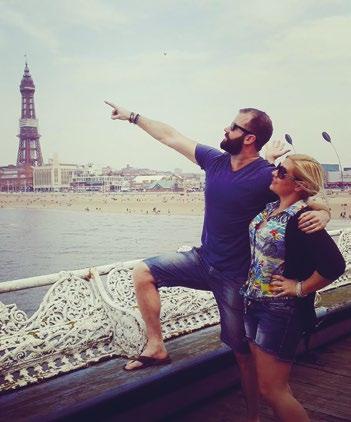
‘’We found each other on a bus in New Zealand’’
Portia (Pip) Jones, 39, travel writer and presenter of The Travel Goals podcast met magician, Matthew J Cope, on a bus in New Zealand in 2013. They haven’t let marriages or children get in the way of their travel-buddy adventures.
Pip on Matt
“Whatever I say about Matt is going to embarrass him, so I might as well get the gooey stuff out of the way: he’s an outstanding human being. His presence lights up a room, his energy invigorates, his laughter is contagious, and his talent breath-taking. Even though he’s a magician and a natural performer, there’s no arrogance about him, and he never hogs the limelight when he’s out with his mates.
So, back to the Kiwi Bus. I was with a bunch of other single travellers at the back of the bus, and I was talking about something very inappropriate, when this Yorkshireaccented voice came booming from behind: ‘I can’t believe you’re talking about THAT… My name’s Matt, by the way.’”
That’s how our friendship, which I believe will last a lifetime, started. After that first meeting, Matt and I extended our stay so we could go to the Bay of Islands. Over the years, we’ve done several trips together – Spain, Edinburgh, Dublin, Wakefield – but our more recent travels have included my husband, and Matt’s partner, Beth, and their children. We’ve even been joined by some of the people who were on the Kiwi Bus with us.
That’s the great thing about our relationship – it has evolved and matured as our lives have. We still have our amazing memories, and we can still laugh like drains about our adventures – among which is us going camping in Abel
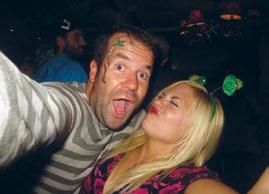
Tasman with not much more than a bottle of wine, two pies and something we imagined was a tent, but everyone else would have more accurately described as a couple of bin bags. But our friendship is multi-dimensional: it’s not something that’s preserved in travel-memory aspic, and we don’t spend hours talking about the good old days, because we’ve got amazingly good new days to come.”
Matt on Pip
“I have two children now, so I don’t often travel solo these days, but I can thoroughly recommend it as one of the best ways to see the world. You can spend as long as you want in the places that appeal to you, and you can meet and get to know people, even locals, on a deeper level.
Travelling alone means you’re receptive to amazing chance encounters, such as when Pip and I met on the Kiwi Bus. Her chat was irresistible – bawdy and hilarious. I waited a few minutes to see what would come out of her mouth next, and then joined in. It turned out she had the same sordid sense of humour, which makes her a great travel companion. What makes her an excellent one, though, is that she is curious and interested, and throws her whole self into adventure. Things also happen to her – it’s not that she’s accident prone, but it will be her luggage that gets lost, her ankles that all the bugs will go for… Once she got stuck in the fire escape of a hotel, with no way out. Luckily, she had her phone, so called me to rescue her.
We’ve had many memorable trips. In Cape Rianga, New Zealand, her inability to hold a crisp packet at the right height so I could help myself while driving, nearly had us killed. Probably the best one of all, though, was when we went to Dublin with the group we met on that bus in New Zealand. What a reunion that was…
Travelling with Pip is not preceded by months, or even minutes, of planning. I’ll just call her and say ‘Mate, I’ve had this idea…’ And we’re off. We live five hours apart, so we don’t see each other as often as we would like. But I was at her wedding – as a performer as well as a guest and she and her long-suffering husband, Luke, are coming to mine and Beth’s.”

Xenia Taliotis
Editor and writer Xenia Taliotis contributes to numerous publications, in the UK and abroad. Her writing appears regularly in The Telegraph, The Times, i News, Women’s Health, and Breathe.

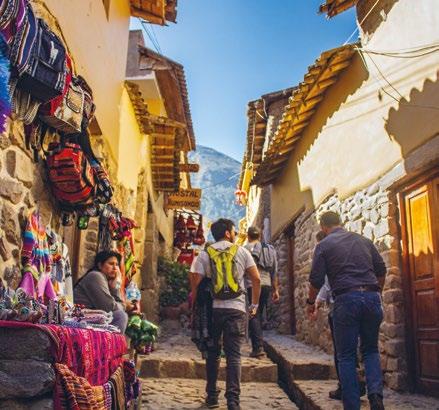
Connect the dots between the ancient Incas, the invention of the surfboard, and the humble potato, and
you’ll
see the contours of Peru etch their way onto the page. This nation of contrasts offers a mix of lifebreathing rainforest and mist-shrouded mountains; of adventure, natural beauty, and a feast of flavours. Here’s all you need to know in a nutshell.
If you’re conjuring up images of ancient Peru, the first thing that springs to mind might be the mysterious Machu Picchu and the legendary history of the Incas. In fact, Peru’s story begins millennia ago, long before the expansive Inca Empire was devastated by the Spanish armies. Throughout Peru’s windswept coastline and snowy peaks, remnants of civilisations such as the Moche, the Chachapoyas, the Chimú and the Nazca indicate a sophistication that pre-dates the Incas by hundreds, and, in some cases, thousands of years. But a visit to the country is much more than an immersive history lesson. Each corner of Peru offers a rich tapestry of history, culture and natural beauty, which any great journey will neatly sew up into a holiday to remember.
1
Take a Hike
Before we begin, let’s make something clear: you absolutely don’t have to be a keen hiker to get the very best out of a trip to Peru. To get within reach of Machu Picchu, for example, you can always take the truly delightful, meandering train journey that snakes slowly up through the towering Urubamba valley. But – and it’s a big but –if there is even the smallest part of you that longs for the outdoors, then Peru is home to some of the best hikes in the world. The Inca
“A visit to the country is much more than a nonstop history lesson.”
Trail is, of course, a classic – a four-day odyssey of Inca ruins, cloud forest foliage, wide-open valleys and starry night skies. But did you know that there are plenty of other paths-less-taken on the pilgrimage to Machu Picchu? The lesser-known Quarry Trail is just one of them – it takes you away from the busier areas and through small villages that are home to local farming families. And if you want to live life at its most vibrant, a trek through the Andean highlands to Rainbow Mountain introduces a visual dopamine hit of vivid reds, oranges, yellows and greens. Still more off the beaten track, the trails that run through the immense Colca Canyon take you into one of the most outstanding natural settings in the Americas. Catching sight of the graceful condor gliding and soaring overhead, their size dwarfed by the enormity of the canyon, is a moment that will live long in the memory.
2
Once the capital of the mighty Inca Empire, Cusco is a natural place to start an Incan pilgrimage. You can almost feel the pulse of the ancient civilisation as you meander through the city streets, where Inca building blocks stand next to ornate Spanish architecture. These days the city is the thriving, persistent heartbeat of Peru’s tourism industry, but its thousands of Quechua-speaking inhabitants have helped to keep it rooted firmly in its indigenous past. Venture further out to the Andean highlands around the
Sacred Valley, and you’ll gain a better insight into the daily lives and religious practices of the Incas, whose descendants farm and work the land even today. Visits to local communities like the one at Misminay, in the Sacred Valley, are a perfect way to learn from their ancestral traditions of weaving and agriculture, as well as sharing a hearty Andean meal of locally sourced ingredients. And of course, at the heart of the Inca narrative lies Machu Picchu, the crowning jewel of their extensive empire. The site these days is well regulated, designed to relieve it of the burden of tourism and let it thrive for generations ahead. Even so, stepping into the ruins for the first time can be a surprisingly emotional experience. Perched atop a misty mountain peak, there’s a permanent sense of wonder here – even among the most seasoned travellers.
According to Inca mythology, Lake Titicaca holds the key to the origins of the Andean world. Legend has it that the god Viracocha rose up from the lake, and created the sun (Inti), moon (Mama Killa), the stars and the first civilisation. This deep-rooted myth still resonates with Peru’s indigenous peoples, including the Aymara-speaking Uros people who live on the lake itself. And when we say on the lake, we really do mean it! Floating islands made entirely of the sturdy totora reed support homes for over 1,000 people. It’s an incredible feat of construction – these stacks
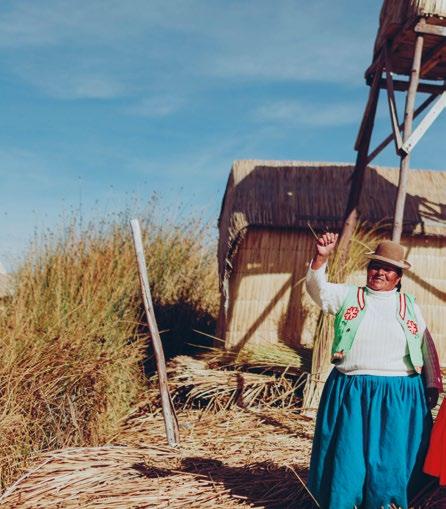
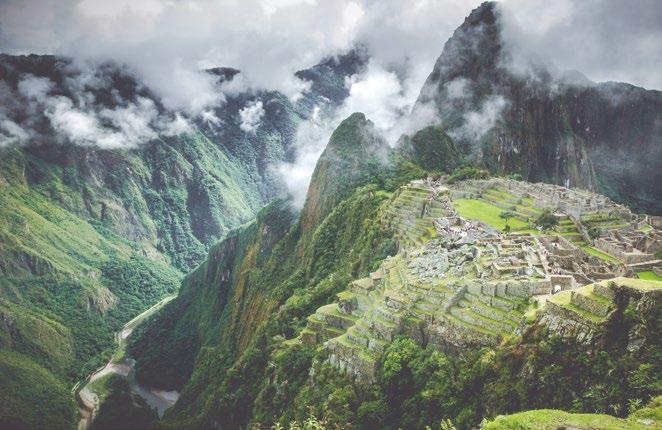

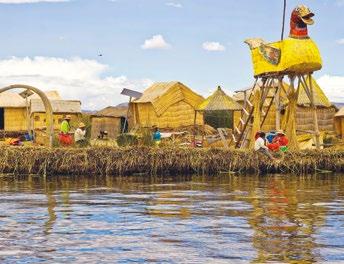
of reed are anchored to the bottom of the lake using eucalyptus stakes and can last for almost 30 years with careful maintenance. There are as many as 100 of these islands still in existence, a mind-blowing example of living in harmony with nature.
Read: Lost City of the Incas. Hiram Bingam’s romantic travel odyssey is a natural introduction to your Peruvian journey.
Watch:
Touching the Void. One of the most thrilling mountaineering stories ever told, whisking viewers to the Peruvian Andes (and to the edge of their seats!).
Listen:
Ditch the panpipes and get in the Latino vibe with Grupo 5, one of Peru’s most famous cumbia groups. You can’t help but dance along to this distinctive sound!
Podcast:
Dan Snow’s History Hit brings the Incas back to life with a special four-part series that reveals the mysteries of Machu Picchu.
Opposite Peru’s most famous sight, the Incan citadel Machu Picchu
Above
The Indigenous peoples of Peru comprise a large number of ethnic groups
Above right
A floating village of the Uro on lake Titicaca
4
Once you’ve had your fill of the mountains, Peru’s Amazon jungle provides the perfect antidote to altitude. An immense 60% of the country is covered by this ode to biodiversity, home to countless endangered species and second in the world rankings of bird diversity. With only a tiny fraction of it accessible you can really feel like the only explorers in the world, all the while knowing that you’ll be rocked to sleep by the sounds of the forest from the comfort of your air-conditioned lodge. Whether you’re looking for a swanky cabaña and pisco sours on the open-air terrace, or would like to get stuck into conservation initiatives run by lodgeadjacent research stations, the wealth of options available in the Amazon means there’s the perfect stay out there for everyone.
“You can really feel like the only explorers in the world, all the while knowing that you’ll be rocked to sleep by the sounds of the forest from the comfort of your air-conditioned lodge.”
5
It’s quite literally no guts no glory in Peru, where every dish is guaranteed to be new, original, and a little bit of an adventure. Don’t fancy seeing your beloved pet guinea pig on the evening menu? You’ll have plenty more to get your teeth into – Lima’s thriving food scene is second-to-none within Latin America, and beginning your gastronomic journey with a trip to a cevicheria is a must. Peru’s national dish, ceviche is a refreshing medley of fresh fish, tangy lime juice, and fiery peppers
Peruvians discovered potatoes on the shores of Lake Titicaca over 10,000 years ago. This humble vegetable didn’t make its way across to the UK until the 1500s.
Although Peru has three official languages (Spanish, Quechua and Aymara), over 40 different languages are spoken throughout the country.
Over 70% of the world’s alpaca population is found in Peru!
Peru has two of the world’s deepest canyons, both twice as deep as the USA’s Grand Canyon.
There are 51 different indigenous groups in Peru – approximately 40% of the population.
Festivals don’t get more local than the rope-braiding festival of the Q’eswachaka –an annual community event to rebuild a 118-foot bridge, made entirely from hand woven rope.
20% of the world’s known bird species live in the Amazon rainforest. 1 2 3 4 5 6 7
that perfectly encapsulates the country’s coastal bounty. In the foothills, Arequipa’s traditional picanterias showcase real, home-cooked farmers food, with hearty rocoto relleno (stuffed peppers) and chicha morada (a purple corn drink) the region’s stand-out dishes. In every village shop you’ll see bottles of bright yellow Inca Cola piled high – worth a try for those with a sweet tooth. Those without, fear not; smooth, limey pisco sours will be on the menu every night.
6
Live it up in Lima
Many travellers eschew Peru’s coastal capital for a quick exit to the mountains, but it’s well worth tagging some time on to explore. For an introduction to the country’s rich history, Lima’s superb Museo Larco is an endless treasure trove, showcasing astounding finds from pre-Columbian cultures that date back to 3,500 BC. Getting out of the historic centre, a trip to bohemian Barranco opens up a world of gothic-style architecture and mural-clad side streets, while modern Miraflores is the perfect place to take in the sea air, with a two-mile ‘Malecon’ – a sea-front walkway of parks, gardens and green spaces along the Pacific Coast.
You’ll find all our tours to Peru at explore.co.uk/peru
Below
Below right
Don’t miss the capital Lima, right by the sea
“Every dish is guaranteed to be new, original, and a little bit of an adventure.”
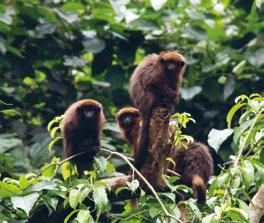

The knowledge and experience of our Explore leaders make for extra special adventures.

Explore’s charismatic Peruvian Tour Leader, spills the beans on the best dish to try and how to survive altitude sickness.
The Peruvian vibe is rooted in our history
Yes, we’re one of the most captivating countries in South America (we have mind-blowing landscapes and wildlife that is totally unique), but our great energy comes from our ancestors. Peru has a big history behind it, and it’s our ancestral knowledge where all our traditions come from, and the good vibes that you feel from our great people!
Altitude sickness is no joke
Peru is an adventure-lover’s paradise of course, and Machu Picchu, as one of the new seven wonders of the world, is a bucket list experience for most people. But altitude sickness is not fun! My advice? Don’t plan any long hikes or busy schedules for the first day. Gradually increase your elevation, eat smaller meals with carbs, drink a lot of water and avoid alcohol.
The food in Peru will take you by surprise
Our gastronomy here is incredible – you’ll get to try some of the most unique and tasty dishes possible. My favourite must-try has to be Lomo Saltado, a very Peruvian food with a blend of Asian and Latin flavours. Tender strips of steak are stir-fried with onions, tomatoes, and French fries – it’s a hearty meal for any occasion (find the recipe on page 23). My restaurant tip?
“We have mind-blowing landscapes and wildlife that is totally unique!”
Cicciolina Tapas Bar & Restaurant near the main plaza of Cusco city. It offers everything from seafood and pasta to grilled meats – and our national drink, the Pisco Sour!
Always come prepared…
Firstly, cash is preferred in Peru, and many shops and food stalls will be cash-only, however both Peruvian soles and US dollars are widely accepted. You can withdraw both from ATMs, and credit cards are accepted at hotels and high-end shops and restaurants. Secondly, Peru has a wet and dry season since it’s in the Southern Hemisphere! Our winter and dry season is from April to October. Temperatures don’t change much – daytime between 17 and 26 degrees. Up in the highlands, days are warm, but nights are chilly.
Every day I learn something new
Working in this beautiful industry, I have the chance to meet new people from all over the world who bring new cultures which make me improve every day as a person and as a professional as well. At the same time as showing our visitors the cultural, historical, and culinary greatness that Peru offers –what’s not to love?
The annual Explore Leader Awards recognise our top leaders; their hard work, passion and dedication to your holiday’s success. Check out our 2023 winners on page 36. Have you had an outstanding Tour Leader on an explore trip? Nominate them at explore.co.uk/leader-awards
Are you even a traveller if you haven’t arrived back with another wooden elephant / rainbow kaftan / awkward earthenware pot / stuffed llama
in your suitcase? Travel journalist Lucy Dunn fesses up to

Below
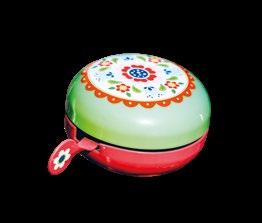


of Ouzo and Limoncello liqueur and some dusty spices and teas that taste like cardboard. As a lifestyle writer I’ve been lucky enough to travel the world, and in my experience, there are two types of souvenir buyers: the ones who shop with their head and the ones who shop with their heart (me). I blame it on my Holiday Goggles. Life looks so different under a big blue sky; the bright hand-painted crockery and flowery lace tablecloths piled high in the street markets; they all look totally chic in our little whitewashed holiday trullo in Puglia with views of the ocean. But in a 1970s terrace in overcast St Albans? Not so much.
According to a recent study by the University of Liverpool, published in the Annals of Tourism Research, we should be spending our money on fridge magnets as they spark the most memories for travellers. And it makes sense: they’re cheap, they fit into your hand luggage and are daily mementos of happy times and, researchers say, are a great “conversation starter when guests visit.” The only problem is you’ll also have to turn a blind eye to the ubiquitous (and slightly depressing)

Tucked in a corner by the stairs is my Cupboard of Shame where I hide my past holiday purchases. Once upon a time I called it my ‘For eBaying/charity/ car boot’ cupboard, but when I realised that no one out there is remotely interested in my collection of Japanese waving cats or my nón lá (Vietnamese bamboo hat), it’s become my guilty secret, partially hidden behind a jumble of dusty coats and the ironing board.
I haven’t opened the door for a long time, but from memory there’s a rug from Istanbul I once haggled to death over, only to get it home and realise the colours were too brash for my room (it’s now home for a burgeoning population of moths). There’s an Indian sari I was going to turn into curtains (when I finally get round to buying a sewing machine) and more straw baskets from the South of France than I can care to mention. (Straw baskets are my catnip.) There’s not just home decor, there’s also a collection of sticky old bottles


‘Made in China’ labels that seem to be on everything no matter where you are in the world these days. Plus, maybe it’s just me, but there’s always a tiny voice in my head worrying about adding to the plastic mountain...
Over the years I’ve got better at leaving my Holiday Goggles at home, and I have my husband to thank for that. Normally an affable, generous soul, he turns extreme Scrooge who huffs and puffs at the merest hint of paying an airline excess baggage. So, I’ve got into the habit of buying compact and useful things that remind me of a specific memory or experience: a bicycle bell to remind me of the time we hired bikes in Amsterdam, a Bialetti Moka Express coffee maker to honour the macchiatos we became addicted to in Florence and a Bento box set in a nod to a delicious lunch I had on a bullet train to Tokyo.
I try to shop local as much as possible to support the local community I’m in, making sure to track down local potteries and crafts
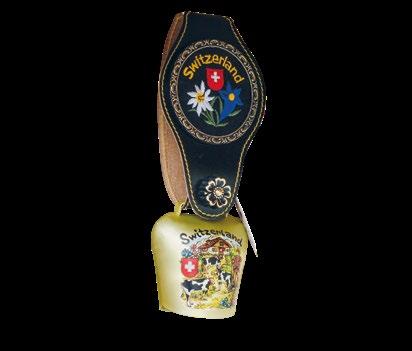
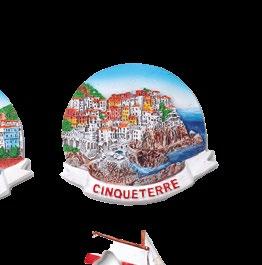
Marseille soap, Marseilles
Argan oil, Morocco
Origami paper, Japan
Calligraphy set, China
Lopapeysas (wool jumpers), Iceland
Espadrilles, Spain
Barro negro (black clay) pottery, Mexico
Hand blocked textiles, India
Aboriginal art, Australia (look for pieces that carry the black and red sphere logo of the Indigenous Art Code).
Photo books – photos get buried on your phone. Have them printed into hardbacks.
workshops so I know where it is coming from, rather than just rely on vague promises that it is ‘locally made’. It goes without saying that I avoid anything that could be supporting poachers or endangering rare species, but unless you’re a species expert, it’s a minefield, so I generally avoid all animal by-products. And I don’t pick shells from the beach (shells provide homes for animals such as hermit crabs, amongst other things) and no longer buy them from stalls after learning about the illegal trade in harvesting shells which threatens marine ecosystems.
While most of my souvenirs conjure up great memories – there’re some I’d rather forget. On a recent holiday to Turkey, I impulsebought a pair of lanterns made from dried gourds – locals drill into them and fill the holes with coloured glass pieces. They can look quite bling-y, so thinking of those St Albans’ grey skies, I snapped up a couple of unfinished ones without the glass from a street vendor. I love them because they look unusual, like I bought them in an expensive art gallery.
Rosewood – all 300 species are now protected by trade restrictions.
Shahtoosh – this shawl is made from the hair of Tibetan antelopes which is an endangered species.
Shells and conches – these are over-harvested, upsetting the marine balance. Also: coral.
Animal by-products – is it ‘fake ivory’ as it claims to be?
Artefacts – Never take things from monuments, ancient ruins, or places with deep cultural or religious significance.

Left
Remember the size and weight capacity of your bag before buying
Below
Lucy with one of her cherished souvenirs, a Vietnamese nón lá (bamboo hat)
The problem came when we needed to get the gourds home. Extreme Scrooge wasn’t having it and a mother of all arguments ensued, resulting in us both having to layer on our clothes, Michelin Man-style, so we could fit them in our suitcase. Getting to the airport, shaking with rage, wearing a swimsuit, three t-shirts, two sweatshirts and a skirt over jeans in ninety-degree heat, isn’t fun. Next time I’ll pack lighter, post things home and stock up on some of those clever compression bags that shrink clothes down. And leave the husband at home? Now there’s a thought...

Lucy Dunn
Lucy, a magazine and broadsheet writer, lives with her husband, dog Spud, and occasionally two sons when they need to do their washing. She is currently Content Director for BOAT International.
Explore’s
leaders are the best in the business. They’re crucial to every individual holiday we run, and we simply couldn’t function without them.
Our annual Tour Leader Awards honour our top leaders, as nominated by our customers and selected by an expert panel. They recognise those leaders that have really gone the extra mile in the last year to make your adventures even more special.
I was born in Petra in 1971. I worked as Officer in the Jordan Armed Forces until 2015, when I retired as Colonel. After that I worked in a travel agency in Jordan while also taking a tour guide training course for six months – I graduated top of my class. I have a BA in English literature and Higher Diploma (Masters equivalent) in Regional and International Relations from Rome.
What do you most love sharing with Explore groups?
Everything. Explore customers are always very curious and interested in my country and I am proud to share it with them. They always especially enjoy the history of my birthplace –Petra – and our local culture and customs like marriage, Bedouin traditions etc.
What do people find surprising when they visit Jordan?
The diversity of our country. It’s not just desert – visitors will see mountains, green areas, and valleys. The history too is so varied, and includes Neolithic, Chalcolithic, Bronze, Iron, Greek, Roman Nabatean, Byzantine, Islamic, Crusaders and Ottoman elements. There is so much to see; so much to learn.
Our Product Manager Valentina Chironna says: “A top Tour Leader and great person with extensive historical and cultural knowledge. I left my trip to Jordan in 2023 having learned so much more about the country and its people. Abdallah’s feedback is consistently excellent. Congratulations, Abdallah!”
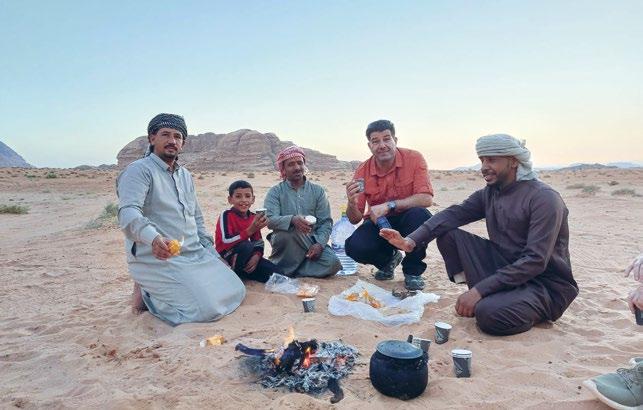

I was born in Hong Kong and raised in Canada, where I first trained as a Tour Leader and led tours through the Canadian Rockies in Western Canada. In 2018, I decided to move to Tokyo to experience living and working as a tour guide in Japan, and I began leading for Explore just as soon as the border opened after the pandemic.
What are you most proud of in Japan?
Our impeccably clean, safe and punctual train network, which we use regularly through all our Explore trips in Japan. Train travel is an integral part of the travel experience when visiting here, it’s such a great way to see the world go by as we travel through rural countryside watching farmers planting rice and fruits, coasting by the seaside watching the tidal waves flow and recede... it’s also comforting to know that we are doing our part contributing to a sustainable future.
What is your favourite local food?
Okonomiyaki, a savoury Japanese style pancake made with loads of vegetables, fresh seafood and meat, handmade from scratch and grilled right in front of all the diners by the chef on a large metal grill plate that usually runs the entire length of the open kitchen inside the restaurant.
Our Product Manager James Adkin says: “David consistently gets 5-star reviews and excellent feedback in our customer surveys.”

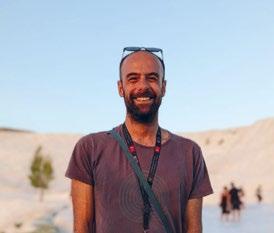
Having had an interest in history and nature since my childhood, I grew up with the Scouts and travelling with my family. I studied at Ankara University before becoming a licensed tour guide in 2009, and I’ve been leading Explore groups ever since. I love introducing visitors to hiking, botany and birding, and visiting historical sites around Anatolia.
What are you most proud of in your country?
The cultural and natural complexity and diversity; the marks left behind from all the living things and civilizations that passed through this area.
What do travellers find most surprising when they visit?
The stunning views, the friendliness of our people, the depth of our history and the number of happy cats and dogs everywhere!
Our Product Manager James Adkin says: “I travelled on a family tour with Tim and he is a wonderful leader – absolutely nothing is too much trouble for him and it’s obvious that he genuinely cares about his groups and ensuring they have the best possible holiday.”
I became a tour guide in 2001 and have been lucky enough to lead so many different trips over the years: cycling, walking, family, boat cruise, classical tours. I was trained by Explore in Vietnam and was so proud to be shortlisted for Explore’s Tour Leader of the Year Award 2018 and 2019 and again in 2024!
What do you most love sharing with Explore groups?
Visitors to Vietnam love to see and learn about our culture. I love sharing our culture, daily life, food and history with them.
What is your favourite local food?
It has to be Banh Mi, a Vietnamese baguette with paté, pork, mayonnaise, cucumber, pickels, chilli...delicious!
Our Product Manager Chris Ellis says: “Binh is a fantastic leader – caring, attentive with a great sense of humour, and he adapts well to all groups and travellers.”
Do you have an Explore holiday coming up?
Make sure our app comes with you.

Apps have become an indispensable part of travelling these days. They simplify trip planning, provide real-time updates, and offer tools for converting currencies or languages on-the-go.
We’ve been keeping a little secret. Here at Explore HQ we’ve been busy working away and we’re very close to launching the brand new Explore app!
Available on iPhone and Android, our app will have everything you’ll need for your trip, in your pocket. Loaded with your own personal itinerary – including accommodation and flights – you’ll receive any updates on the go, even changes to flight time and departure gate. It’s also got live weather, to help you plan your days (and clothing) as you go.


The app works offline, so you can access it even in the most remote of locations, or on the road, and you can personalise it further by adding your own notes, memories and even travel photos.
In short, our app will ensure you’re in-theknow during your trip, is designed to make your holiday run more smoothly and remove the need for paper trip notes in your packing. Whether it’s checking your itinerary, tracking your flights, or finding your way around a new city, we’ve got you covered. Don’t just travel, Explore!
A few lucky travellers will be asked to test the Beta version of the Explore app in the coming weeks. Stay tuned!
This video editing and image design app lets you edit and merge video footage from your phone to create brilliant short films and reels. Create a visual summary of what you’ve done today or a wrap up of your whole trip to share with friends and family or via your social channels. We love it!
Create customisable packing lists for your upcoming trip, with recommendations according to the weather forecast, your activities and whether you’ll have access to a laundry. You can even tick things off as you pack them – we all love a checklist!
An oldie but a goodie, XE will immediately convert local currency for you. Ideal for multi-country trips or destinations that take two different currencies.
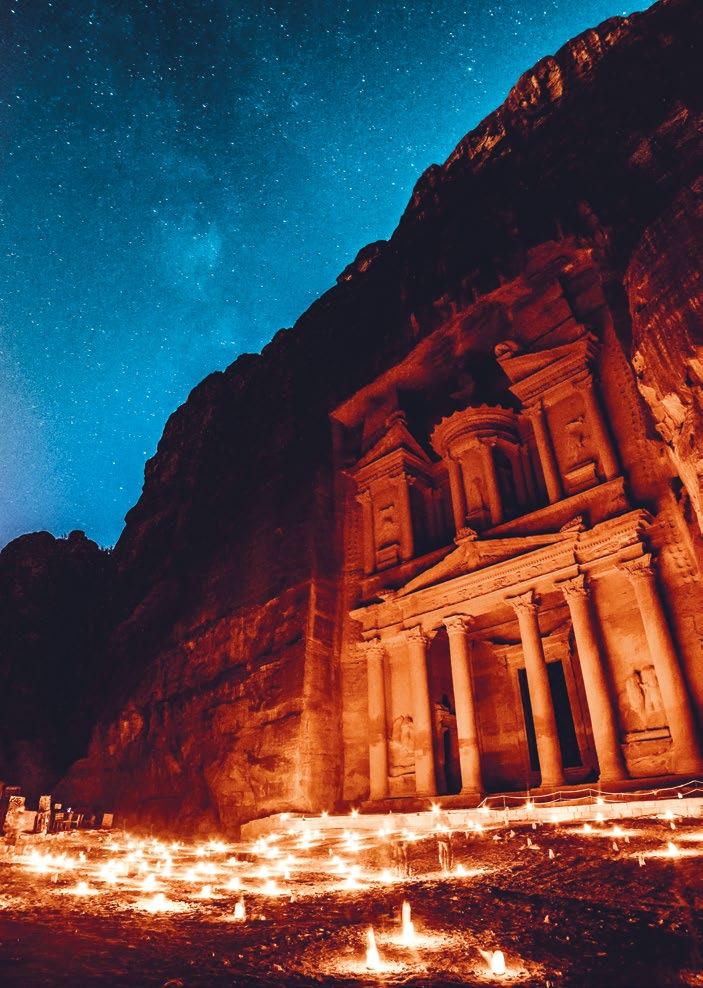
From the unreal beauty of rock-carved Petra to the lunar landscapes of Wadi Rum, Jordan is steeped in bucket-list gems. Book your trip now and journey through the ancient monuments of Amman and beyond, uncover the tombs and temples of the fabled rose-red city, and sleep on the dunes of the desert, all while getting a taste of Jordanian life, both today and long ago.
Check out our discovery, walking, cycling and foodie tours in Jordon now. Find out more

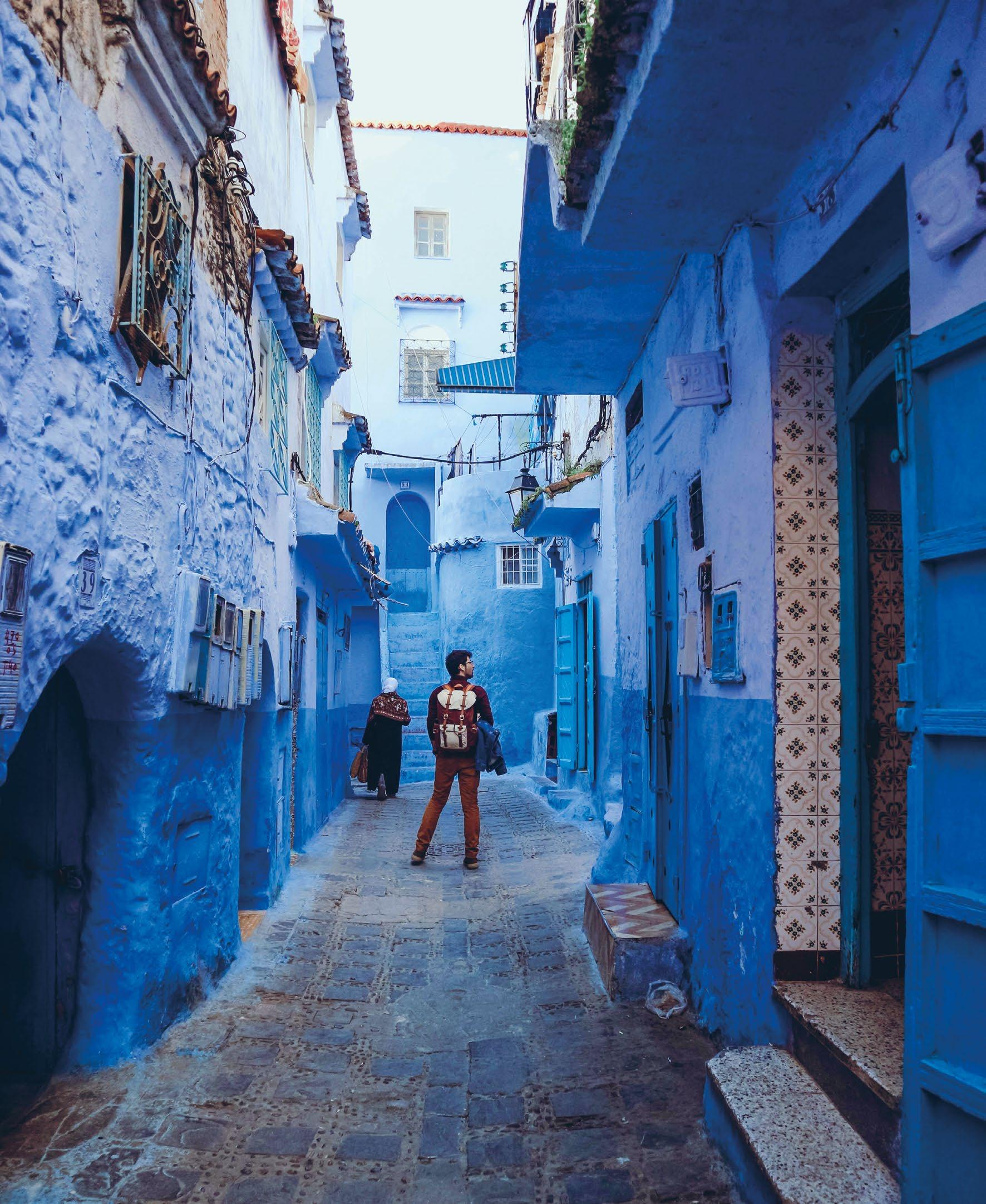
Tunbridge Wells: 01892 511999
Cranbrook: 01580 714411
Grantham: 01476 285400
Haywards Heath: 01444 473081
Lewes: 01273 472466
Maidstone: 01622 762141
Sevenoaks: 01732 458255
Tenterden: 01580 764344
Tonbridge: 01732 351223
Uckfield: 01825 760488

